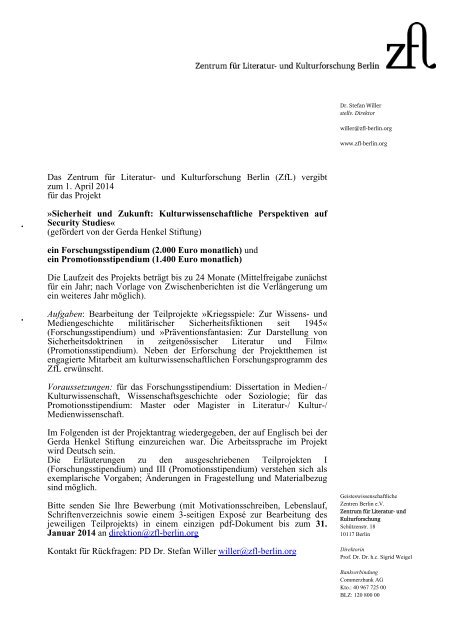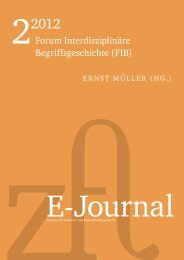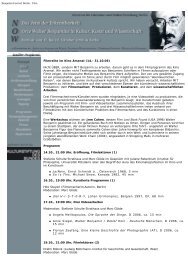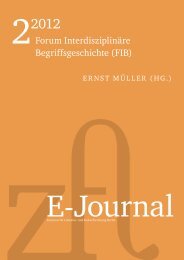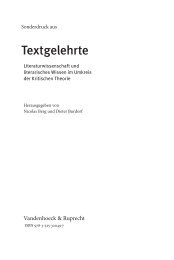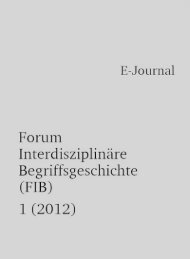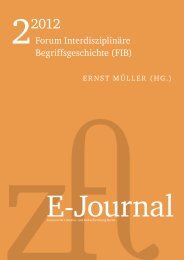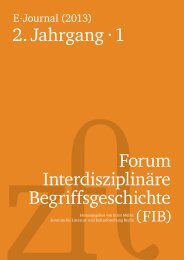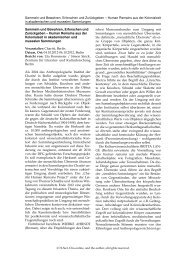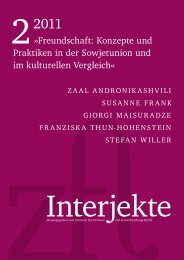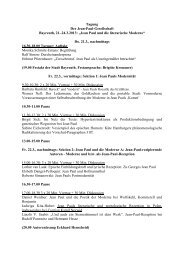Das Zentrum für Literatur- und Kulturforschung Berlin (ZfL) vergibt ...
Das Zentrum für Literatur- und Kulturforschung Berlin (ZfL) vergibt ...
Das Zentrum für Literatur- und Kulturforschung Berlin (ZfL) vergibt ...
You also want an ePaper? Increase the reach of your titles
YUMPU automatically turns print PDFs into web optimized ePapers that Google loves.
Dr. Stefan Willer<br />
stellv. Direktor<br />
willer@zfl-berlin.org<br />
www.zfl-berlin.org<br />
<strong>Das</strong> <strong>Zentrum</strong> für <strong>Literatur</strong>- <strong>und</strong> <strong>Kulturforschung</strong> <strong>Berlin</strong> (<strong>ZfL</strong>) <strong>vergibt</strong><br />
zum 1. April 2014<br />
für das Projekt<br />
»Sicherheit <strong>und</strong> Zukunft: Kulturwissenschaftliche Perspektiven auf<br />
Security Studies«<br />
(gefördert von der Gerda Henkel Stiftung)<br />
ein Forschungsstipendium (2.000 Euro monatlich) <strong>und</strong><br />
ein Promotionsstipendium (1.400 Euro monatlich)<br />
Die Laufzeit des Projekts beträgt bis zu 24 Monate (Mittelfreigabe zunächst<br />
für ein Jahr; nach Vorlage von Zwischenberichten ist die Verlängerung um<br />
ein weiteres Jahr möglich).<br />
Aufgaben: Bearbeitung der Teilprojekte »Kriegsspiele: Zur Wissens- <strong>und</strong><br />
Mediengeschichte militärischer Sicherheitsfiktionen seit 1945«<br />
(Forschungsstipendium) <strong>und</strong> »Präventionsfantasien: Zur Darstellung von<br />
Sicherheitsdoktrinen in zeitgenössischer <strong>Literatur</strong> <strong>und</strong> Film«<br />
(Promotionsstipendium). Neben der Erforschung der Projektthemen ist<br />
engagierte Mitarbeit am kulturwissenschaftlichen Forschungsprogramm des<br />
<strong>ZfL</strong> erwünscht.<br />
Voraussetzungen: für das Forschungsstipendium: Dissertation in Medien-/<br />
Kulturwissenschaft, Wissenschaftsgeschichte oder Soziologie; für das<br />
Promotionsstipendium: Master oder Magister in <strong>Literatur</strong>-/ Kultur-/<br />
Medienwissenschaft.<br />
Im Folgenden ist der Projektantrag wiedergegeben, der auf Englisch bei der<br />
Gerda Henkel Stiftung einzureichen war. Die Arbeitssprache im Projekt<br />
wird Deutsch sein.<br />
Die Erläuterungen zu den ausgeschriebenen Teilprojekten I<br />
(Forschungsstipendium) <strong>und</strong> III (Promotionsstipendium) verstehen sich als<br />
exemplarische Vorgaben; Änderungen in Fragestellung <strong>und</strong> Materialbezug<br />
sind möglich.<br />
Bitte senden Sie Ihre Bewerbung (mit Motivationsschreiben, Lebenslauf,<br />
Schriftenverzeichnis sowie einem 3-seitigen Exposé zur Bearbeitung des<br />
jeweiligen Teilprojekts) in einem einzigen pdf-Dokument bis zum 31.<br />
Januar 2014 an direktion@zfl-berlin.org<br />
Kontakt für Rückfragen: PD Dr. Stefan Willer willer@zfl-berlin.org<br />
Geisteswissenschaftliche<br />
Zentren <strong>Berlin</strong> e.V.<br />
<strong>Zentrum</strong> für <strong>Literatur</strong>- <strong>und</strong><br />
<strong>Kulturforschung</strong><br />
Schützenstr. 18<br />
10117 <strong>Berlin</strong><br />
Direktorin<br />
Prof. Dr. Dr. h.c. Sigrid Weigel<br />
Bankverbindung<br />
Commerzbank AG<br />
Kto.: 40 967 725 00<br />
BLZ: 120 800 00
Gerda Henkel Fo<strong>und</strong>ation, Special Programme Security, Society, and the State<br />
Topic Focus 5: “Security Strategies between Doctrine Formation and Implementation”<br />
Security and the Future:<br />
A Cultural Studies Approach<br />
Applicants: PD Dr. Stefan Willer (Center for Literary and Cultural Research <strong>Berlin</strong>), PD Dr.<br />
Benjamin Bühler (Center for Literary and Cultural Research <strong>Berlin</strong> /University of Constance)<br />
1. Problem Statement and Research Interest<br />
Problem Statement<br />
The planned project investigates, from a cultural studies perspective, the connection between<br />
security and futurity. It analyzes the epistemic and cultural presuppositions of ‘security’ by<br />
focusing on I.) military scenarios since 1945, II.) debates on political ecology and risk prevention<br />
since 1970 and III.) representations of security and prevention in contemporary literature<br />
and film. By drawing on these cultural phenomena that have a broad impact on contemporary<br />
Western societies, the project aims to broaden both scientific research and public debate on<br />
security issues.<br />
Concepts as well as practices of security grow from their specific linkages to the future. Just<br />
like the term ‘security’ connotes strategy and planning, the very notion of security is prospective<br />
– prospective in a two-fold manner: For one, ‘security’ denotes our present-day management<br />
to reduce the potential of risk in the future, or to at least prolong the current, assessable<br />
situation into the future. At the same time, the term implies we possess assured knowledge of<br />
the future: It thus assumes a kind of presupposed certainty about the future. However, when it<br />
comes to debates of security within political, economical and technical domains, this presupposition<br />
of a certified knowledge about the future remains largely unheeded, as do its<br />
constitutive, legitimizing and organizing qualities. The role of climate research for the present<br />
debate on climate change can be <strong>und</strong>erstood as an example for this blind spot within current<br />
discussions of security issues: Politicians expect concrete statements from climate researchers<br />
concerning future changes of climate and suggestions as to what kind of preventive measures<br />
may be taken. Climate researchers, however, cannot meet these expectations, since they are<br />
only able to deliver prognoses of probability. The social significance of these prognoses lies<br />
precisely in the production and communication of uncertainty (Hulme 2009).<br />
Due to these often unrecognized, varying forms of assumptions about the future and the conflicts<br />
resulting from them, our project aims to investigate, from a cultural studies perspective,<br />
the connection between security and futurity. We will systematically examine the ambivalence<br />
tied to the concept of ‘security’: being secure and being sure. The project’s epistemological<br />
research trajectory thus aims at the issues and questions raised in topic focus 5, “Secu-<br />
2
ity Strategies between Doctrine Formation and Implementation.” We plan to address the gap<br />
between strategic principles and their implementation by focusing on a level below the originating<br />
of that gap, that is by revealing the epistemic and cultural presuppositions of these<br />
doctrines. In unveiling these shrouded presuppositions of the implementation process, and<br />
with a thorough analysis of their consequences, we hope to contribute to the debate on present-day<br />
security policy.<br />
Research Interest<br />
The charged bond between doctrines of security and what we consider as ‘knowledge’ of the<br />
future calls for a thorough analysis of the varied forms of this knowledge. The currently prevailing<br />
idea of prevention, for instance, links imaginations of the future with precautionary<br />
action. Utopian and dystopian fictions conceptualize futuristic forms of society, whether they<br />
might be totalitarian or anarchic. Narratives of progress suggest that both our individual security<br />
and security policies are constantly improving, all the while narratives of crisis suggest<br />
the exact opposite: it is the future decline of social organization that calls for higher security<br />
standards now. Thus strategies of security are gro<strong>und</strong>ed predominantly in prospective speech<br />
acts like promising or warning, and whether we create diagrams, tables or computer simulations<br />
– all scenarios of the future (or processes extending into the future) are significantly<br />
shaped by the particular media technology and narratives that are used to establish them. Present-day<br />
concepts of security are the result of a historical change of paradigm: From the premodern<br />
notion of an imperturbable world order established by God, to our modern, secularized<br />
form of society, which is marked by uncertainty but also by the possibility to shape and<br />
mold the future (Makropoulos 1997).<br />
In the following we will delineate the focal points of research that shape the project’s design<br />
into three subprojects.<br />
Institutionalization: In systematic and temporal terms, ‘security’ advances as the central category<br />
of governmental and non-governmental institutions. The collective civil transition in the<br />
late 19 th century towards an ‘insurance society’ demonstrates that no longer the state alone<br />
defines what is conceived <strong>und</strong>er the term security, but also life insurance companies and disciplines<br />
like statistics. Insurance policies, which function “as a form of assurance” aim to<br />
“discipline the future” by calculating risk (Ewald 1989, 387). In general, during the course of<br />
the 20 th century sciences like statistics and economy seem to evolve into specialist fields for<br />
anticipating the future, and their prognostications are deemed helpful by political authorities<br />
for their decision making. The military in particular emerges as an institutional guarantor for<br />
security, whether the army is declared, in the 21 st century, as a suitable tool for pursuing the<br />
vision of a peaceful and democratic Middle East – this is the notion with which then-U.S.<br />
president George W. Bush tried to legitimate the war in Iraq –, or whether the “security of the<br />
3
Federal Republic of Germany is being defended in the Hindu Kush too,” as the German former<br />
Minister of Defense Peter Struck declared. In this context, Subproject I will concentrate<br />
on military strategies of security and examine how scientific statements, disciplines and protagonists<br />
are incorporated in different security doctrines, and what kind of dynamics arise in<br />
the interstices of military, science and the state.<br />
Interpretative Dominance: The problematic choice of which security policy to follow is often<br />
aggravated when different protagonists display digressing ideas about security in general:<br />
Whether security is <strong>und</strong>erstood as a subjective feeling or as an objective condition, whether<br />
the security concern is of technical or political nature etc. – the term remains polyvalent. Thus<br />
on the one hand, security can be seen as a “catch-all term of modern times” adumbrating a<br />
utopian horizon of expectation (Münkler 2010, 22f.) while on the other hand, it can clearly<br />
navigate political agency in a certain direction. A current example in Germany of the latter<br />
case would be the nationally implemented transition towards alternative energy sources in the<br />
wake of the nuclear reactor disaster in Japan’s Fukushima. Here, a current incident in combination<br />
with potential future events led to a turnaro<strong>und</strong> of the political program of a party up<br />
till then supportive of nuclear energy. Several dimensions of meaning and divergent aspects<br />
of security concurred in this situation – technical and economical, social and ecological, personal<br />
and political – all to be integrated due to the prospective nature of the debate. The example<br />
illustrates how the ecological discourse plays a central role in the contemporary conception<br />
of security issues, from the debate on the radiating fallout after nuclear weapons testing<br />
to the debate of climate change. Subproject II will explore the mechanisms of motivation<br />
at play in developing security strategies against the backgro<strong>und</strong> of ecological issues, with a<br />
clear focus on how these mechanisms contribute to the conflict of interpretative dominance of<br />
the future.<br />
The Regime of Prevention: A special focus of attention will be placed on the degree of social<br />
effectiveness that the linkage between concepts of security and futurity has attained by now.<br />
Whenever human interventions are concerned, the aspect of effect must be considered an integral<br />
part of what we view as ‘knowledge’ about the future. The feedback of all the players<br />
involved in a system contributes to consistently changing that system, and thereby also to<br />
changing the assumed state of the future as it needs to be continually re-aligned. Generated by<br />
science and imparted through various media, our present-day assumptions about the future are<br />
implemented through such feedbacks. This does not only concern the ethical discourse on<br />
‘sustainability’ in economics, ecology and politics, it also applies to the cultural techniques of<br />
prophylaxis and prevention, ranging from medical to military strategies. With respect to the<br />
beginning of the 21 st century it may be justified to think of a veritable regime of prevention, a<br />
regime of preserving the status quo and maintaining the present. In contrast to the vigor of this<br />
situation the historical critique and cultural reflection of the idea of prevention is still in its<br />
4
infancy. Subproject III is directed to fill this gap and intends to provide a cultural-historical<br />
study that scrutinizes the cultural imaginations of prevention as sketched in literature and<br />
film.<br />
2. State of Research to Date<br />
Our project follows up on a number of diverse studies within the history of concepts (e.g.<br />
Hamilton 2013) and on sociological studies on the differentiation of concepts (Ewers/Nowotny<br />
1987; Luhmann 2003; Münkler/Bohlender 2010). In contrast and addition to<br />
what these studies offer, our project emphasizes the ambivalence and lack of definition adhering<br />
to the concept of ‘security.’ Our project argues that it is exactly this ambivalence, the<br />
metaphorical character of the term ‘security’ that shapes the discourse on security policy significantly.<br />
In terms of a theoretical discussion of security, François Ewald’s study L’état<br />
providence (1986) is central: Since, as Ewald has shown, social aspects are economized in<br />
today’s state forms, the state discharges its citizens into a life of self-care, leaving them to<br />
their own devices with respect to risk management (Bröckling 2008, 46; cf. Bröckling 2007).<br />
In his comedy Der Untergang der Titanic, Hans-Magnus Enzensberger claims that innovation<br />
is made possible only through the disaster that preceded it. Following this thrust, our project<br />
will take a closer look at studies that discuss the concept of security from an angle of accident<br />
and catastrophe, such as Ulrich Beck’s widely discussed book Risikogesellschaft. Auf dem<br />
Weg in eine andere Moderne (1986), Paul Virilio’s essay L’accident originel (2005), the volume<br />
Die Unordnung der Dinge. Eine Wissens- <strong>und</strong> Mediengeschichte des Unfalls (2009),<br />
edited by Christian Kassung, or the works by Eva Horn and Claus Pias on the epistemology of<br />
accident in the modern era, on worst case scenarios, and on military knowledge (Horn 2007,<br />
2010, 2011; Pias 2009, 2013). Further gro<strong>und</strong>work on the topics of effect assessment in technology<br />
and political consultancy has been published by Grunwald (2008, 2012).<br />
Our research on strategies of security will depart methodologically from these studies and<br />
steer along a new path by using the cultural studies methods of finding the historically hidden<br />
aspects of knowledge.<br />
3. Preliminary Studies by the Applicants<br />
Both applicants have been working since October 2010 in the project “Prognostics and <strong>Literatur</strong>e,”<br />
which will terminate in December 2013. We have analyzed historical situations of<br />
change from the early modern era to the present, examining the different ways of perspectivation<br />
of the future. Prognostics (literally meaning “pre-knowledge”) is <strong>und</strong>erstood here as a<br />
two-sided kind of knowledge: as knowledge about futurity (here ‘future’ takes on the role of<br />
an epistemic object) as well as knowledge in the future (here ‘future’ takes on the role as epistemic<br />
temporality, or epistemic mode, respectively). The results gathered in that project will<br />
5
e a vital base for the planned follow-up project, which will focus on the knowledge about the<br />
future implied in security discourses.<br />
The research results of the previous project will be published in an interdisciplinary edition,<br />
Glossar des Zukunftswissen (Munich: Fink, 2014 tbc.). In addition, both applicants are currently<br />
working on a joint literary monograph, Zukünfte der <strong>Literatur</strong> (<strong>Berlin</strong>: Kadmos, 2014<br />
tbc.). Further preliminary work includes several essays by both applicants (cf. bibliography).<br />
4. Objective, Methods, and Design of the Project<br />
The planned project will be headed by the applicants, who will also play an integral part in the<br />
actual work in progress on the basis of their preliminary studies (see paragraph 3) and as parts<br />
of their institution, the <strong>Berlin</strong> based Center for Literary and Cultural Research (Willer: Co-<br />
Director; Bühler: Heisenberg scholar). Stefan Willer will sign responsible for establishing the<br />
theoretical set-up of the project, as well as covering the research in the area of a history of<br />
concepts, tracing the historical semantics and imagery of the term security. He will act as<br />
main coordinator and be in charge of mentoring the dissertation thesis. Benjamin Bühler will<br />
continue to work on his Heisenberg project on Political Ecology, which in terms of topic,<br />
problem and method fits tightly into subproject II of this application.<br />
We are applying for material costs to conduct the project, and for the costs for personnel (stipends)<br />
for two of the three subprojects (Subproject I: postdoc; Subproject III: doctoral student).<br />
Subproject I: War Games. The History of Knowledge and Media in Military Fictions of Security<br />
since 1945<br />
Planning and strategy have always been an integral part of military action; however it is safe<br />
to assume that the expert protagonists involved in strategic planning have also always known<br />
reality to turn out a lot different from their plans. Carl von Clausewitz was the first to establish<br />
the formula of the “friction in war” in this respect. According to him, “the absolute, the<br />
mathematical as it is called, no where finds any sure basis in the calculations in the art of<br />
war.” From the outset there would be a play of possibilities, probabilities, good and bad luck,<br />
which “makes war of all branches of human activity the most like a game of cards.” (Clausewitz<br />
2009, 49 <strong>und</strong> 22). Clausewitz’ words refer to the conduct of war, yet they might just as<br />
well be applied to military strategies of security. These strategies need to anticipate future<br />
scenarios so that the army or state are rendered capable of acting. In order to be able to react<br />
to the enemy’s motions, his potential actions need to be anticipated, which is why all military<br />
‘knowledge’ of security is fictional in essence (see Horn 2007).<br />
This subproject shall investigate the backgro<strong>und</strong> for such fictions of security. It analyzes the<br />
strategies of argumentation and simulation, and questions the relation between military-<br />
6
strategic planning and political action. As its point of departure, the subproject will focus on<br />
the linkage between futurity research and war scenarios within the empiric futurity research<br />
post 1945, so-called ‘futurology.’ Herman Kahn, an expert for military strategies of the<br />
RAND Corporation at the time, sketched the consequences of a potential nuclear war in his<br />
1960 book On Thermonuclear War. We will scrutinize this key text of security studies to find<br />
out what kind of projection techniques – especially in a quantitative sense – have been used<br />
after World War II to gauge the effects and consequences of certain military actions.<br />
Against the backgro<strong>und</strong> of these historic scenarios stemming from the Cold War period, we<br />
will inquire in a second step into current military fictions of security. Specifically we will<br />
examine how new forms of enemies – networks, swarms, ‘sleepers’ – call for new techniques<br />
of modeling the future, for example research on the behavior of swarm systems (Horn/Gisi<br />
2009). Swarms are decentralized, self-organized collectives, whose potential conduct cannot<br />
be assessed in terms of simple causalities but may only be devised by computer simulations.<br />
Our subproject examines in how far our present-day simulations, scientifically advanced and<br />
technically complex as they are, still legitimate relatively ‘crude’ strategies of security. By<br />
this we mean for instance comprehensive monitoring systems like the U.S. American Echelon<br />
system, or biometric systems of identification. Since it is possible that the diffuse definition of<br />
security is the basic principle of such legitimations, we shall look into who the protagonists<br />
are that are involved in the transfer from science and technology to politics and thus contribute<br />
to the implementation of extensive strategies of security.<br />
The plan is to openly announce the postdoc stipend and fill it with a media scientist who also<br />
has competence in the history of knowledge. S/he will be asked to produce two studies (i.e.<br />
comprehensive essays), one on Herman Kahn and one about contemporary military fictions of<br />
security; if necessary, the suitable candidate may also draft a larger monographic study (e.g.<br />
habilitation thesis) on the topic.<br />
Subproject II: Scenarios of Catastrophe. On Political Ecology since 1970<br />
Since the 1970s, statements on ecological issues have become an integral part of social selfconceptualizations.<br />
‘Ecology’ in this sense is not to be <strong>und</strong>erstood as a sub-discipline of biology<br />
but rather as a ‘hybrid discipline’ (Enzensberger 1973) comprised of such different forms<br />
of knowledge as biology, chemistry and physics, but also ethical values, political views and a<br />
certain attitude towards life in general (Trepl 1987). The ecological discourse is especially apt<br />
for inspecting the mechanisms of doctrine formation and implementation because it cannot be<br />
linked to a certain social system (Luhmann 1986). In effect the discourse of political ecology<br />
works with all kinds of references to the future, which however always serve the legitimization<br />
and organization of political agency in the present, so that the sketching of future eco-<br />
7
logical disasters serves to legitimate present-day strategies of security, which are implemented<br />
solely for the purpose of preventing such a disastrous future from happening.<br />
We will look at documents from the 1970s depicting scenarios of disaster and check for their<br />
relation to the budding environmental movement of the time. Documents to be analyzed are<br />
the political essays by Carl Amery and Heinrich Gruhl, the public and scientific discussions<br />
aro<strong>und</strong> Denis Meadow’s study Limits to Growth, as well as manifestos like A Blueprint for<br />
Survival (1972). We will also include novels such as Amery’s Der Untergang der Stadt Passau<br />
(1975) or Ernest Callenbach’s Ecotopia (1975) and Ecotopia Emerging (1981). In a second<br />
step, we will focus on today’s debate on climate change and evaluate the strategies of<br />
security that might become vital if the effects of climatic change should become more drastic.<br />
As a theoretical bracket bringing these two research foci together we will contemplate the<br />
question as to where exactly the interpretative dominance lies these days; in other words, who<br />
has the power to determine what the future will look like? It is significant in this respect that<br />
at the moment scientific and fictional forms of representation seem to intersect in a wholly<br />
novel way. While Roland Emmerich’s movie 2012 (2009) creates scenarios of disaster in a<br />
spectacular fashion, Michael Crichton’s novel State of Fear (2004) claims climate change to<br />
be a fantasy created by eco activists – a claim which led to an official hearing at a committee<br />
of the U.S. American Senate. And while politicians hope to receive concrete instructions from<br />
climate researchers as to how to proceed, scientists in this field refuse to be politically exploited.<br />
This subproject is already well prepared and is f<strong>und</strong>ed as part of Benjamin Bühler’s Heisenberg<br />
stipend (see paragraph 3). We envisage publishing two studies (essays) on the topic as<br />
part of a planned monograph Regierungswissen. Politische Ökologie im 19. <strong>und</strong> 20. Jahrh<strong>und</strong>ert.<br />
Subproject III: Fantasies of Prevention. The Representation of Security Doctrines in Contemporary<br />
<strong>Literatur</strong>e and Film (Dissertation project)<br />
The notion of prevention may count as one of the most effective doctrines of security today.<br />
Prevention means to be prepared for the future in a way to outsmart it, that is, to make sure<br />
something does NOT happen in a certain way. This also means that the notion of prevention is<br />
characterized by a strange negativity: Future itself turns into the “causa finalis of its own prevention”<br />
(Fuchs 2008). The doctrine of prevention is seen as the standard for a responsible<br />
way of dealing with one’s life and that of the next generation. This applies similarly to precautionary<br />
actions by domestic and foreign affairs against potential terrorist attacks, but also<br />
on a ‘biopolitical’ level to the exploding number of medically prophylactic offers. Such complex<br />
(and slightly paradoxical) thinking in negative anticipations has turned into an extremely<br />
normative handling of futurity.<br />
8
Due to its social relevance, the concept of prevention has gathered distinct momentum in literature<br />
and film alike over the course of these past years. Subproject III focuses on these fictional<br />
representations of the concept. We will determine the basis for doctrines of prevention<br />
by studying current discussions in sociology (Bröckling 2008) and analyze the origins of the<br />
idea of prevention by looking at practices of insurance and precaution; by following its theorization<br />
within the sociological framework of risk; and by analyzing its current role in medical,<br />
military, and political debates. The main body of research will be a close reading of several<br />
examples of contemporary literary and filmic representations of prevention: How do<br />
these fictionalizations deal with the prospective structure of preventive thinking? How do they<br />
contemplate the notion’s current power and its potential consequences? Examples to be discussed<br />
are the fictitious pre-cognitive “Precrime” Office in Steven Spielberg’s movie Minority<br />
Report (2002), the dystopia of a medical-prophylactic dictatorship in Juli Zeh’s novel<br />
Corpus Delicti (2009) or the technological fantasies of surveillance and military pre-emption<br />
in Daniel Suarez’ novels Daemon (2006) and Kill Decision (2012).<br />
The dissertation project will argue that the novels and movies do not only incorporate the<br />
concept of prevention into their narrative structure, but represent narratologically what they<br />
transport on a topical level, thereby problematizing the very concept. The project reviews the<br />
narratological aspects of the discourse of prevention in detail: The advantage of knowledge on<br />
the side of the narrator, insinuation and overtones, directional conventions for reader guidance,<br />
techniques of narration as anticipation of the plot etc. Such a literary and mediatheoretical<br />
analysis can clarify the structure of preventive thinking.<br />
The doctoral stipend shall be openly announced and filled with a student of literature or media<br />
science.<br />
The goal of the overall research project is to offer a cultural-theoretical reflection of the problems<br />
attached to questions of state, security and society. We strive to explicate the theoretical<br />
preconditions of the multidimensional and ambivalent domain of security issues. By conjoining<br />
three exemplary research set-ups we aim to explore the linkage between doctrines of security<br />
and futurity. While the implementation of doctrines follows largely pragmatic reasoning<br />
(and has to do so), our project wants to unearth the hidden epistemic presuppositions that significantly<br />
shape these doctrines, yet are mostly overlooked. We target the conceptual gro<strong>und</strong>s<br />
and the suppressed mechanics of the implementation process, thereby helping to shed light on<br />
the often rogue systematic of security strategies. Thus if supported, our project will present a<br />
valuable input from a cultural studies angle to the controversial topic of security studies.<br />
Bibliography:<br />
Beck, Ulrich: Risikogesellschaft. Auf dem Weg in eine andere Moderne, Frankfurt/Main 1986.<br />
9
Bröckling, Ulrich: <strong>Das</strong> unternehmerische Selbst. Soziologie einer Subjektivierungsform,<br />
Frankfurt/Main 2007.<br />
Bröckling, Ulrich: “Vorbeugen ist besser… Zur Soziologie der Prävention,” in: Behemoth. A<br />
Journal on Civilisation 1 (2008), H. 1, pp. 38-48<br />
Bühler, Benjamin: “Zukunftsbezug <strong>und</strong> soziale Ordnung im Diskurs der politischen Ökologie,”<br />
in: Zeitschrift für Kulturwissenschaften 2 (2009), pp. 35-44.<br />
Bühler, Benjamin: “Repräsentationen der Ökologie,” in: ecozone@ 1 (2010), n. p.<br />
Bühler, Benjamin: “Entgleitende Regulierungen. Politische Ökologie im 20. Jahrh<strong>und</strong>ert,” in:<br />
Stefan Rieger, Manfred Schneider (Eds.), Selbstläufer / Leerläufer. Regelungen <strong>und</strong><br />
ihr Imaginäres im 20. Jahrh<strong>und</strong>ert, <strong>Berlin</strong>/Zurich 2012, pp. 177-197.<br />
Bühler, Benjamin: “Von ‘Hypothesen, die auf einer Hypothese gründen.’ Ökologische Prognostik<br />
in den 1970er Jahren,” in: Daniel Weidner, Stefan Willer (Eds.): Prophetie <strong>und</strong><br />
Prognostik Verfügungen über Zukunft in Wissenschaften, Religionen <strong>und</strong> Künsten,<br />
Munich 2013 (in print).<br />
Enzensberger, Hans Magnus: “Zur Kritik der politischen Ökologie”, in: Kursbuch 33 (1973),<br />
pp. 1-42.<br />
Evers, Adalbert/Nowotny, Helga: Über den Umgang mit Unsicherheit. Die Entdeckung der<br />
Gestaltbarkeit von Gesellschaft, Frankfurt/Main 1987.<br />
Ewald, François: L’état providence, Paris 1986.<br />
Fuchs, Peter: “Prävention – Zur Mythologie <strong>und</strong> Realität einer paradoxen Zuvorkommenheit,”<br />
in: Irmhild Saake/Werner Vogd (Eds.): Moderne Mythen der Medizin. Studien zur organisierten<br />
Krankenbehandlung, Wiesbaden 2008, pp. 363-378.<br />
Grunwald, Armin: Technik <strong>und</strong> Politikberatung. Philosophische Perspektiven, Frankfurt/Main<br />
2008.<br />
Grunwald, Armin: Technikzukünfte als Medium von Zukunftsdebatten <strong>und</strong> Technikgestaltung,<br />
Karlsruhe 2012.<br />
Hamilton, John T.: Security: Politics, Humanity, and the Philology of Care, Princeton 2013.<br />
Horn, Eva/Gisi, Lucas (Eds.): Schwärme – Kollektive ohne <strong>Zentrum</strong>. Eine Wissensgeschichte<br />
zwischen Leben <strong>und</strong> Information, Bielefeld 2009.<br />
Horn, Eva: Der geheime Krieg. Verrat, Spionage <strong>und</strong> moderne Fiktion, Frankfurt/Main 2007.<br />
Horn, Eva: “Enden des Menschen. Globale Katastrophen als biopolitische Fantasie,” in: Reto<br />
Sorg and Stefan B. Würffel (Eds.): Utopie <strong>und</strong> Apokalypse in der Moderne, Munich<br />
2010, pp. 101–118.<br />
Horn, Eva: “Die Zukunft der Dinge. Über Unfälle <strong>und</strong> Sicherheit,” in: Behemoth. A Journal<br />
on Civilization, 2011, n. p., online: www.behemoth-journal.de<br />
Hulme, Mike: Why we disagree about climate change. Understanding controversy, inaction<br />
and opportunity, Cambridge 2009.<br />
Luhmann, Niklas: Soziologie des Risikos, <strong>Berlin</strong> 2003.<br />
Luhmann, Niklas, Ökologische Kommunikation. Kann die moderne Gesellschaft sich auf ökologische<br />
Gefährdungen einstellen? Wiesbaden 1986.<br />
Makropoulos, Michael: Modernität <strong>und</strong> Kontingenz, Munich 1997.<br />
Münkler, Herfried: “Strategien der Sicherung: Welten der Sicherheit <strong>und</strong> Kulturen des Risikos.<br />
Theoretische Perspektiven,” in: Herfried Münkler/Matthias Bohlender/Sabine<br />
Meurer (Eds.): Sicherheit <strong>und</strong> Risiko. Über den Umgang mit Gefahr im 21. Jahrh<strong>und</strong>ert,<br />
Bielefeld 2010, pp. 11-34.<br />
Pias, Claus (Ed.): Abwehr. Modelle Strategien Medien, Bielefeld 2009.<br />
Pias, Claus (Ed.): Herman Kahn. Szenarien für den Kalten Krieg, <strong>Berlin</strong>/Zurich 2013 (in<br />
print).<br />
Trepl, Ludwig, Geschichte der Ökologie. Vom 17. Jahrh<strong>und</strong>ert bis zur Gegenwart. Zehn Vorlesungen,<br />
Frankfurt/Main 1987.<br />
Virilio, Paul: L’accident originel, Paris 2005.<br />
10
Willer, Stefan: Prophetie <strong>und</strong> Prognostik. Verfügungen über Zukunft in Wissenschaften, Religionen<br />
<strong>und</strong> Künsten, Munich 2013 (ed. with Daniel Weidner, in print).<br />
Willer, Stefan: “Prognose,” in: Historisches Wörterbuch der Rhetorik, ed. Gert Ueding, vol.<br />
10: Ergänzungen A–Z, Register, Tübingen 2011, col. 958-966.<br />
Willer, Stefan: “Vom Nicht-Wissen der Zukunft. Prognostik <strong>und</strong> <strong>Literatur</strong> um 1800 <strong>und</strong> um<br />
1900,” in: Michael Bies, Michael Gamper (Eds.): <strong>Literatur</strong> <strong>und</strong> Nicht-Wissen. Historische<br />
Konstellationen in <strong>Literatur</strong> <strong>und</strong> Wissenschaft, 1750–1930, Zurich 2012, pp.<br />
171-196.<br />
Willer, Stefan: “Zwischen Futur Eins <strong>und</strong> Futur Zwei. Georg Kleins Grammatik der Zukunft,”<br />
in: Christoph Jürgensen, Tom Kindt (Eds.): “Wie in luzidem Schlaf.” Zum Werk<br />
Georg Kleins, <strong>Berlin</strong> 2013, pp. 131-141.<br />
Willer, Stefan: “Dietmar Daths enzyklopädische Science Fiction,” in: Stefan Willer (Ed.):<br />
Roman als Enzyklopädie, special issue of arcadia (2013, in preparation).<br />
11


